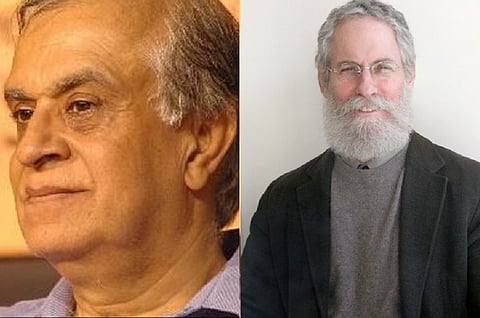

Rohan Murthy, son of Infosys founder NR Naryana Murthy has put his foot down and declared that Indologist Sheldon Pollock will continue to guide translations of Indian classics into English. So, he is doing this work with his money at the Murty Classical Library of India (MCIL) at Harvard University. There is, however, an online petition chastising him for working with Pollock – considered controversial in his erudition on Indic studies – instead of working with Indians better versed in Sanskrit. So what’s new?
Murty, currently a scholar at Harvard, set up the library in 2010 with an endowment of $5.2 million. Responding to the petition he said “It is quite rich to sit in the peanut gallery, pass comments and throw empty shells at those who are actually rolling their sleeves up and working on the ground.” Some132 academics and public figures have signed the petition and Rajiv Malhotra Founder of the Infinity Foundation and renowned Hindu activist is also lending his voice to calls to oust Pollock. Malhotra, who has a large following in India has authored several books among them Breaking India that speaks to the theory of Balkanisation of India – a theory which has dogged India since independence and one which not entirely without merit. More recently, there have been calls for a library versus library competition to outdo the MCIL.
This is the bane of India and Indians – instead of pooling our resources and pulling as a team in the same direction, we fight over morsels. We pull each other down and then wonder why we are not taken seriously. Maybe Pollock is a faux Indologist, maybe his antipathy towards India and Indic culture is well documented, maybe Murty is making a mistake and maybe all the petitioners and their supporters keen to restore India’s past glory and revive Sanskrit and empower knowledge in Indic culture are right. Hold that thought for a bit.
There is no doubt that for several decades western scholars have told Indians to give them the data so they can return a theory. Nothing prevented us from developing our own theories from our own data. It is certainly the case that the region now called India and earlier stretching from Afghanistan in the west to Vietnam and beyond in the east was the cradle of a civilisation that produced brilliant works of science and arts. It is certainly the case that what is taught in Indian schools as history needs to be challenged and junked where necessary. A recent case in point is the controversy over textbooks for class four pupils commissioned by former Congress minister Kapil Sibal (activist lawyer Teesta Setalvad oversaw this work) extolling the virtues of the Gandhi dynasty.
Scholarship by definition is an exchange that grows with challenge. A culture that abhors challenge or refuses to imbibe new perspectives will stagnate before rotting. Learning of Sanskrit as well as studying Indian texts is like reading the Bhagvad Gita with a teacher or guru whose role as the remover of doubt and darkness is primordial. Socratic tactics of questions and answer are designed to foster critical thinking, and students are encouraged to engage and discard, engage and discover. If you are a true scholar, dialogue, not diatribe must be your compass. The petitioners have erred in their method and Murty’s peanut imagery is in poor taste.
Paranoia on all sides must stop. Conspiracy theories must be discussed threadbare and discarded once and for all. Competition should swing upwards, to bring the best of knowledge in the best medium - read technology – to all who are keen to learn a language, read a book or compose a piece of music. The public is not dupe. Put the material out there and trust yourself instead of suspecting others.
The other critical issue is the currency of a language. It is not for nothing that small and large trading nations speak in a link language called English. Sanskrit and Latin are no longer languages of business and trade and will never be. They hold in them wisdom of arts, science warfare, love and hate bearing testimony to human progress. There is no one shoe-fits-all winner here. Recently when The News Minute (TNM) reported about an online Sanskrit course developed by an Indian and a Chinese student in America, we were pilloried by some for praising ‘western’ efforts. Every effort has its merit and we are spoilt for choice by technology. Read here.
The contradictions in what some sections of Indians are trying to achieve are glaring. We go into paroxysms of joy when mediocre journalists from the west praise India in their columns and poorly researched journal articles acknowledge Indic contributions as a footnote. We are outraged when footnotes are missing. If we continue to seek a larger part of the pie we so publicly despise, we will perpetually remain as footnotes. To break open and even, we require genuine ambition, faith, humility and massive resources - make our own pie. We are all here for a limited period of time and each is entitled to what is best for him or her. A culture with such deep roots as the Indic one cannot be shaken with a whiff of air. If it does, then there is a problem. Probably the current debate has more to do with egos and less with erudition.